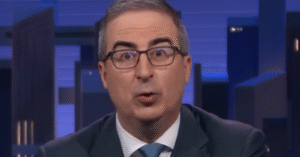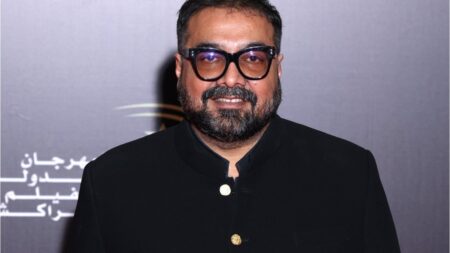Over the weekend, just blocks away from President Trump’s June 14 military parade in Washington, D.C., the third annual DC/DOX got underway. The four-day documentary film festival kicked off on June 12 and highlighted films that explore some of America’s most pressing issues, including school shootings, book banning that target race and LGBTQIA+ issues, attacks on free speech and the country’s growing income and wealth divide.
Director Anayansi Prado was at DC/DOX with “Uvalde Mom,” a feature doc about the 2022 mass school shooting that rocked the small town of Uvalde, Texas, and left 19 children and two teachers dead. Prado said that screening her film in D.C. during the military parade felt meaningful.
“There are so many films here that are addressing really important social justice and global issues, so I think it’s really significant and interesting that this festival is taking place on the day of the military parade,” Prado said. “The fact that we are all here as a community of documentary filmmakers, I look at it as if we are holding space, and that’s an act of resistance.”
Founded by Sky Sitney and Jamie Shor in 2022 with the goal of bringing together innovative visions, bold voices, and timely stories in Washington, D.C., the 2025 edition of DC/DOX included 59 features and 35 shorts from over two dozen countries.
Several hit docs from Sundance 2025 were part of this year’s DC/DOX lineup, including Geeta Gandbhir’s “The Perfect Neighbor,” “2000 Meters To Andriivka” directed by Oscar-winner Mstyslav Chernov (“20 Day In Mariupol”), David Osit’s “Predators,” Kim Snyder’s “The Librarians,” Ryan White’s “Come See Me in the Good Light,” and Heidi Ewing and Rachel Grady’s “Folktales.”
As crowds gathered across the U.S. to participate in “No Kings” rallies protesting the Trump administration, Erika Dilday, who runs PBS’ POV and America ReFramed, addressed recent news that the House of Representatives approved legislation to eliminate the next two years of PBS federal funding.
“We aren’t going anywhere,” Dilday said during the fest’s June 14 state of the industry panel discussion. “We are going to fight.”
One of the most controversial docs to come out of Sundance 2025 – Bao Nguyen’s “The Stringer” – made its DC/DOX debut on June 15. It’s only the second fest that “The Stringer” has screened at since its debut in Park City.
The film claims that Nick Ut, the Associated Press photographer who won a Pulitzer Prize for taking a 1972 Vietnam War photo popularly known as “Napalm Girl,” wasn’t the photo’s author. Instead, the doc alleges that Nguyen Thanh Nghe, a freelancer and a driver for NBC, actually captured the image and has been denied recognition for decades.
Nguyen and an investigative team led by Gary Knight, founder of The VII Foundation, and producers Fiona Turner and Terri Lichstein, interviewed 55 people, including Nghe and former AP photo editor named Carl Robinson, who claims he was pressured to change the credit by his boss. They also drew on forensic evidence, such as images and footage taken of the event, and commissioned 3D modeling to try to prove Ut was not in a position to take the photo that made him world-renowned.
After “The Stringer” premiered at Sundance, the blowback was intense. James Hornstein, an attorney for Ut, said in an email that “a defamation action will soon be filed against the filmmakers.” Nguyen, who was in D.C. for the screening of “The Stringer,” said that a lawsuit from the AP never surfaced. The director added that he was “a little surprised” by the blowback.
“We knew that the story would be disruptive for many reasons in the photojournalist and journalism community as a whole,” Nguyen said. “But my observation from what has gone on since the film premiered at Sundance is that simply asking the question gets people in trouble in some ways. I believe that one of the tenets of journalism is asking the questions and pursuing the truth. Certain aspects of the conversation and dialogue about the film and the subject have made me rethink whether people want the question to be asked, and if it is, they are expecting a certain answer, or they are not willing to listen.”
In May, after a lengthy investigation, World Press Photo suspended Ut’s credit for the iconic photograph. That same month, the AP decided not to change the credit on the famous photograph.
DC/DOX concludes on June 15.
Read the full article here








